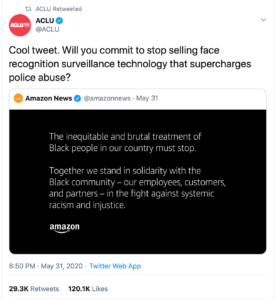Photo Credit: Clay Banks, Unsplash
Media reports since the tragic news of the killing of George Floyd in Minneapolis on 25th May are sadly all too familiar, as others have died in the past in similar circumstances. This is an ongoing problem that hasn’t been fixed, and as a consequence, it has grown in complexity and scale, while systemic racism has festered and taken hold since the abolition of slavery.
What is different with George Floyd’s killing, however, is the reaction of members of the public. They are so outraged that they are taking personal risks by participating in mass protests during a global pandemic, where public health restrictions preclude such gatherings. Several have commented that “this time it feels different”.
Many leaders have made a supportive public stance, but many more are still considering their position. This is an issue that won’t go away, but a default passive position is no longer tenable for those who value their reputation and integrity. Many leaders are asking “What should we say and do?”
The immediate corporate reaction to the protests on both sides of the Atlantic has been mixed. All have chosen one of three options:
Solidarity announcement: A statement of support and solidarity denouncing racism and declaring a commitment to racial equality in society, usually announced on their website and/or social media platforms. Many have responded like this, but this approach must be strategic, with a long-term plan to convert this support to action. Janice Gassam recently wrote in Forbes Magazine:
“While it is important for your company to not remain silent during these tumultuous times, it’s hard to distinguish performative allyship from authentic and genuine intentions that will lead to actual change.”
It is important to be authentic and genuine. If you are not, you will be called out, as Amazon was here:

Committed support to tackle racial inequality: This is usually in combination with a solidarity announcement and is a public commitment answering the ‘call to action’. Examples of corporate giants responding this way are Sony Music announcing a $100m social injustice funding, and Ben & Jerry’s – long-time supporters of BLM – making direct demands to the US Government to tackle the root causes and effects of systemic racism.
Nothing: This is the least advised option. Reading the placards, the assessment from the street is “Silence is violence”. Converting this into the language of the boardroom, Brayden King, a professor at Northwestern University's Kellogg School of Management in Chicago, says:
"There are a lot of corporate leaders who are genuinely sympathetic. There's also a wariness of being on the wrong side of the issue and having their reputation damaged… At this point there's more risk in not speaking out than in speaking out."
For those either wondering what to say or how to say it, or what the next steps should be, here are three areas of activity that can underpin any ongoing communications strategy supporting racial, social injustices.
Uncomfortable conversations
Fully understanding the societal root of the problem is key. It is evident everywhere – not just the workplace. It is, however, crucial to acknowledge both the understanding and the extent of conscious and unconscious racism within organisations. Internal work groups can play a critical role in working through the identified issues and getting corporate cultures to change. It goes beyond recruitment policies and diversity programmes. It is encouraging and supporting employees as individuals to have honest conversations with themselves, as well as their families and colleagues, and changing behaviours and mindsets.
Understanding customers and clients is equally important, as organisational purpose and brand values come under scrutiny. Listening to those who drive the success of your organisation is key. If they question your values, ask yourself why. Reinforce your corporate values through actions, and ensure they reflect your organisation and brand.
Where there is resistance, where many see this as a taboo minefield, get on the ground and start poking around to find out where the mines are, then safely remove them. Longer-term, this makes for a more comfortable, equal, happy and productive work and customer base. Moreover, it is the right thing to do.
Level the playing field
In the UK, the Race Relations Act, its various amendments, and civil rights campaigns have done much to advance racial equality over the years. The fact remains however that the issue of inequality still exists. The playing field is not yet level. Poor education and disadvantage are common bedfellows across all races in UK society and are often where the playing field is seen by many as a mountain. Educating and training people for the modern workplace is key, regardless of sector or geography.
Many NGOs run initiatives that are always looking for CSR partners and supporters. Impetus is a charity that “transforms the lives of young people from disadvantaged backgrounds by ensuring they get the right support to succeed in school, in work, and in life”. There are many others. Leaders looking to commit to more strategic ways of supporting racial equality and longer-term change should consider this, as it will make a tangible difference in redressing the equality imbalance at an early stage in young people’s lives.
Organisations can also consider supporting an established foundation funding that supports ethnic minority education and learning, or set up their own foundation to support sector skills development and ethnic diversity. Taylor Bennet, a communications executive search consultancy, set up The Taylor Bennet Foundation in 2008. Alumni Betty Anash explains the impact of the Taylor Bennet Foundation on her career:
The Taylor Bennett Foundation was pivotal in my career - without it I'm confident I wouldn't have had an opportunity to enter the PR industry. It not only changes the lives of the trainees who join but I think the mindsets of those at the companies who host and mentor them.
Reconciliation and redress
It is clear from the protests, news reports and social media feeds that the strength of feeling is high, and people are angry. Years of injustice, tenacity, oppression and frustration are clear to see. As with any conflict, there needs to be a process of reconciliation in order to move on. Organisations have a number of ways they can support this process, both in the workplace and in the wider society:
Public Affairs: Lobbying for change in laws and address structural and systemic racism. If you don’t have the internal capacity to do this, ask your trade organisation to lobby on your behalf, e.g. the Federation of Small Businesses (FSB) or the Confederation of British Industry (CBI).
Corporate activism: Advocacy and campaigning can be conducted in conjunction with employees and customers, contingent on strong values and appropriate resources. The Body Shop founder Anita Roddick was the original corporate activist, and this approach is still used today, most recently in calling for a global ban on animal testing in the cosmetics industry.
Community outreach: Investing in identified communities is a longer-term option that can involve employees, local authorities, support groups and the wider community. Community-based CSR activities helps to break down any perceived or real barriers, as well as provide a platform for dialogue that aids reconciliation. A policy of listening is essential in any reconciliation process: community outreach can help provide this.
Seeing how the world reacted to the killing of George Floyd, the temptation is to think that “it will pass”. It won’t, unless structural and systemic racism disappears. Moreover, racism is ethically and morally wrong, it is unhealthy in a civic society, and threatens a secure and stable environment. It won’t “pass” if nothing is done to tackle its root cause. This is also a fundamental principle of issues management. Delay or failure to do so increases the risk of the issue becoming a full-blown crisis, as we witness every time there is a racially motivated killing.
True courage in leadership involves speaking up and taking action when something is wrong. A few brave leaders had the courage to speak up and act to abolish slavery: it was a 46-year campaign in the UK between 1787 and 1833. Reconciliation and dealing with the legacy of inequality are more than 200 years overdue. It will now take many more brave leaders collectively to speak up and do the right thing. Be one of them.
References:
Forbes article by Janice Gassam: “Dear Companies: Your BLM Posts Are Cute But We Want To See Policy Change:
Response to Amazon solidarity tweet: https://twitter.com/ACLU/status/1267181557195907078
Sony Music Group announces $100 million global social justice fund:
Ben and Jerry’s “Silence Is NOT An Option: https://www.benjerry.com/about-us/media-center/dismantle-white-supremacy
Professor Braydon King’s comments: https://www.personneltoday.com/hr/global-businesses-embrace-black-lives-matter-movement/
Impetus – charity partnership matching service for support to disadvantaged young people: https://impetus.org.uk
Taylor Bennett Foundation: https://www.taylorbennettfoundation.org
Federation of Small Businesses: https://www.fsb.org.uk/resources-page/black-lives-matter-and-business-must-change.html
Confederation of British Industry: https://www.cbi.org.uk/articles/cbi-stands-against-racial-injustice/
Wiki page with short history of the abolition of slavery and its place in UK history: https://en.wikipedia.org/wiki/Abolitionism_in_the_United_Kingdom

